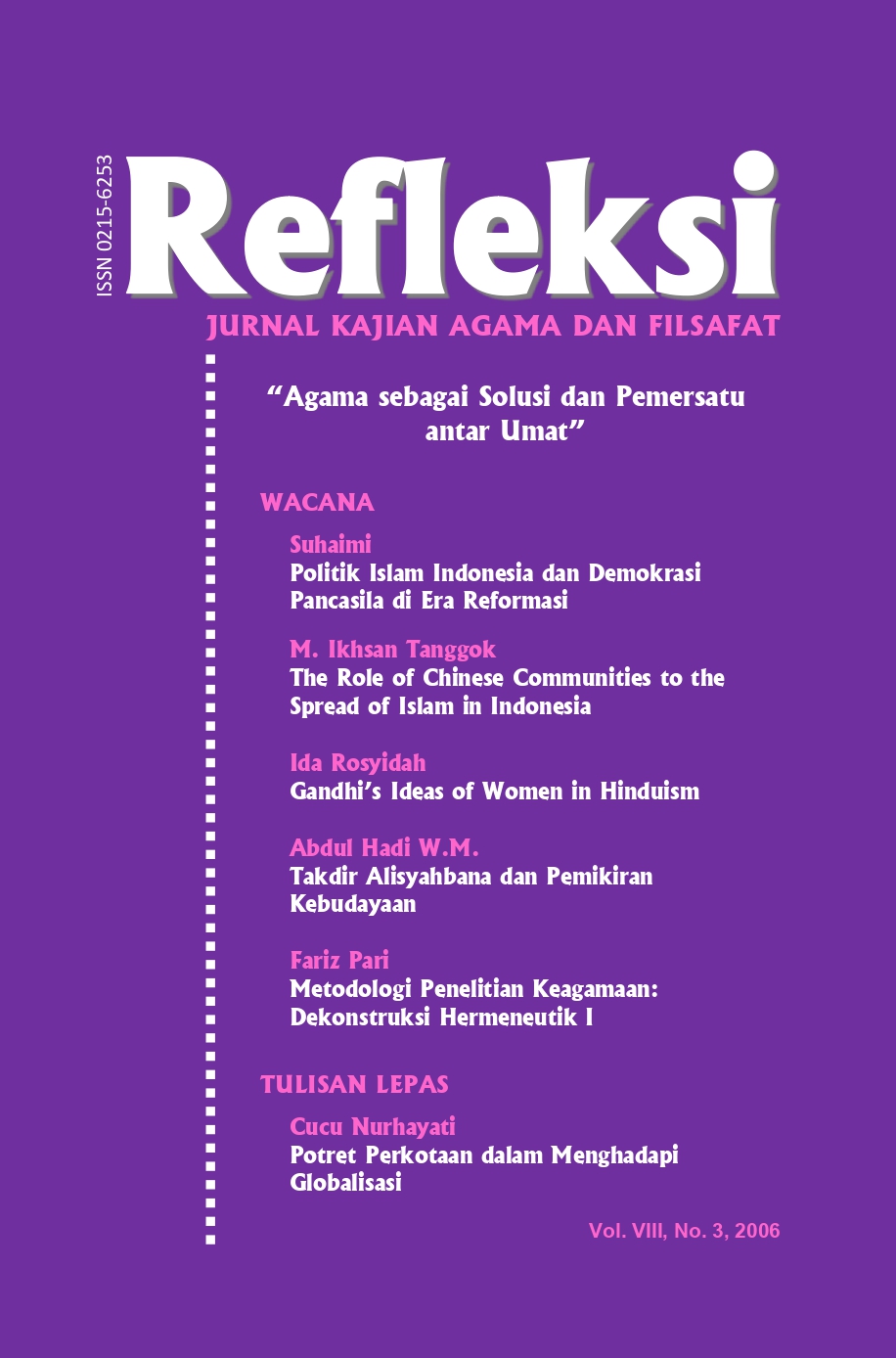Takdir Alisjahbana dan Pemikiran Kebudayaan
DOI:
https://doi.org/10.15408/ref.v8i3.37757Keywords:
Sutan Takdir Alisjahbana, Yukichi Fukuzawa, Culture, Islam, West.Abstract
This essay will attempt to discuss specific aspects of cultural thought by Sutan Takdir Alisjahbana (STA), especially those related to values. However, before delving into STA’s cultural thought, the definition of culture as it developed up to the early 20th century CE, particularly within the intellectual traditions of Islam and the West, will be presented. Towards the end of this essay, a comparison will be drawn between STA’s thoughts and those of Yukichi Fukuzawa, a Japanese civilization expert who lived from the mid-19th to the early 20th century CE, whose ideas influenced the direction of Japanese modernism in various fields.
References
Abdullah, Taufik. “Islam dan Paradigma Kebudayaan Nasional”, dalam Endang Syaifuddin Ansari (ed.), 80 Tahun Muhammad Natsir, Ban-dung: Pustaka, 1988.
Alisjahbana, Sutan Takdir. Values as Integrating Forces in Personality, Soci-ety and Culture, Kuala Lumpur: University of Malaya Press, 1966.
-------. “Pembahasan Makalah Koentjoroningrat tentang Kebudayaan Nasional”, dalam Alfian (ed.) Persepsi Masyarakat tentang Kebudayaan (h.41-53), Jakarta: Gramedia, 1985.
Arif, Asikin. “Filsafat Kebudayaan Sutan Takdir Alisjahbana dan Tan-tangan Post Modernisme”. Dalam S. Abdul Karim Mashad (ed.), Sang Pujangga, Jakarta: Pustaka Pelajar, 2005.
Al-Attas, Syed Muhammad al-Naquib, Islam dan Sekulerisme, Bandung: Pustaka, 1972.
Beg. Abdul Jabbar. Perspektif Peradaban, Bandung: Pustaka, 1986.
Beardsley, Monroe C. The European Philosophers from Descartes to Nie-tzsche. New York: Modern Library, 1960.
Bloom, Allan. The Closing of the American Mind. New York: Simon and Schuster, 1987.
Durant, Will. “The Story of Civilizations”. Vol. I. New York. The Pocket Library, 1955.
-------. The Story of Philosophy. New York: Pocket Book Inc., 1957.
‘Effat al-Sharqawi. Filsafat Kebudayaan Islam. terj. A. Rofi’ Usmani. Ban-dung: Pustaka, 1986.
Ewing, A. C. A Short Commentary on Kant’s Critique of Pure Reason. Lon-don: Methuen, 1938.
Fizee, A. Kebudayaan Islam. Jakarta: Bulan Bintang, 1982.
Freud, Sigmund. Civilization and Its Discontents. New York-London, 1961.
Gellner, Ernest. Posmodernism, Reason and Religion. London and New York: Routledge dand Kegan Paul, 1992.
Khaldūn, Ibnu. Al-Muqaddimah. Cairo: al-Maktabah al-Tijariyah al-Kubra, 1284 H.
-------. The Muqaddimah: An Introduction to History. Trans. Franz Rosen-thal. Princeton: Bollingen Series XLIII, 1980.
Martineau, Harriet. The Positive Philosophy of August Comte. London: Ox-ford University Press, 1943.
Matson, Floyd. The Broken Image: Man, Science and Society. Garden City New York: Double Day & Company Inc., 1966.
Prosch, Harry. The Genesis of 20th Century Philosophy, the Evolution of Thought from Copernicus to the Present. New York: Thomas Y. Crowell Company, 1971.
Sardar, Zianuddin. Sains, Teknologi dan Pembangunan di Dunia Islam. Bandung: Pustaka, 1989.
Taylor, E. B. Primitive Culture: Researches into The Development of Mythol-ogy, Philosophy, Religion, Language, Art and Custom. Boston: Estes & Lauriat, 1871.
White, L. A. “The Concept of Culture”. dalam M. F. Ashley (ed.) Culture in the Evolution of Man. Oxford: Oxford University Press, 1962.
Windelband, Wilhelm. A History of Philosophy II. New York: Harper & Row, 1958.
Wayne, H., The Speeches of Fukuzawa: A Translation and Critical Study. Oxford: Oxford University Press, 1973.
Yukichi, Fukuzawa. An Outline of a Theory of Civilization. Trans. David A. Dilworth and G. Cameron Hurst. Tokyo: Sophia University, 1973.








